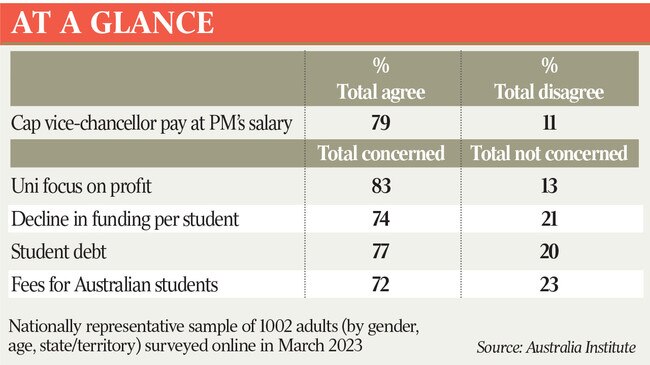Poll backs cap on university chiefs’ pay at PM level
Four out of five Australians back a salary cap for vice-chancellors to limit their $1m salaries to the PM’s $560,000 a year.

Four out of five people back a salary cap for university vice-chancellors to limit their remuneration to the $560,000 earned annually by the prime minister, according to a new public opinion survey by the Australia Institute.
The survey, published a week before the Albanese government releases a major review of universities, also finds that five in six Australians are “concerned” that universities “prioritise profit over education”, with half “very concerned” by this issue.
In a briefing paper based on the survey, the Australia Institute’s Centre for Future Work blames governments for a steady reduction in public funding of universities that drove them to rely more on international student fees and investment revenue.
Universities’ public funding is down from 0.9 per cent of GDP in 1995 to 0.6 per cent in 2021, the paper said, which amounts to $6.5n in funding foregone in 2021.
Since 1995, private sources of funding tapped by universities nearly doubled from 22 per cent of revenue to a high of 43 per cent in 2019, driven by the explosion in international student numbers.
Tuition fees – of international and domestic students – make up 51 per cent of total funding for universities in Australia, compared with the OECD average of 22 per cent, the paper says, citing an OECD report.
It said universities were now acting like businesses instead of public institutions and their governing councils “which now consist largely of members appointed from corporate backgrounds” had set vice-chancellors’ remuneration by corporate norms.
In most universities, the vice-chancellor’s salary package is close to, or exceeds $1m a year, which “constitutes a fundamental departure from the way other public institutions approach remuneration,” the paper said. “The average vice-chancellor salary is almost twice that of the prime minister of Australia – arguably the most important job in the country.”
The survey of 1002 people in March this year found 79 per cent of them supported capping vice-chancellors’ salaries at what the prime minister was paid.

It also revealed very strong concern across the political spectrum about the declining level of public funding for universities, and the level for student fees and student debt.
The survey found 79 per cent of Labor voters and 70 per cent of Liberals were “concerned” or “very concerned” by a 20 per cent fall in government funding per student (after inflation) in the past decade.
It also found 77 per cent of Labor voters and 68 per cent of Liberals were “concerned” or “very concerned” about fee levels for Australian students.
The paper – titled Public Attitudes on Issues in Higher Education and written by Eliza Littleton from the Centre for Future Work – said the business-based approach to managing universities had affected students and university staff by “turning degrees into commodities, students into customers, and workers into a target for cost-cutting”.
It called on the Albanese government to use the University Accord review, whose interim report is due next Wednesday, to restore “adequate funding”, improve university governance and “ensure education is treated again as a public service and a human right rather than a traded community”.
National Tertiary Education Union national president Alison Barnes said there was “clearly palpable concern for universities across the community … whether it’s funding cuts, insecure work, student debt or increasing class sizes, it’s patently clear … there are high levels of concern,” she said.




To join the conversation, please log in. Don't have an account? Register
Join the conversation, you are commenting as Logout